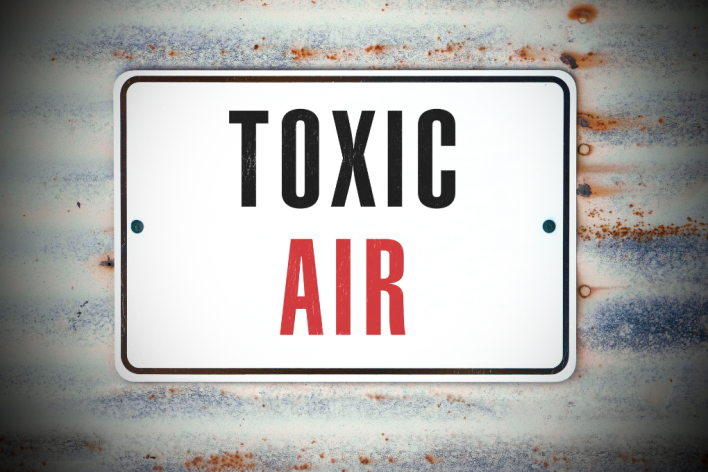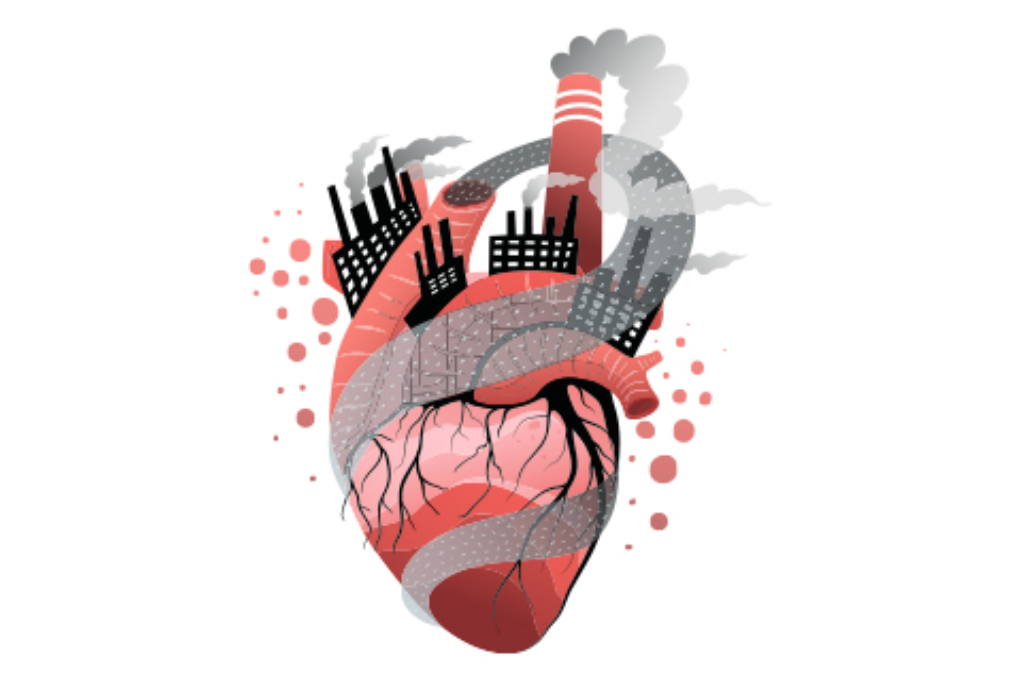
Breathing is something we do effortlessly without even thinking about it. But have you ever stopped to consider the quality of the air you’re inhaling? In today’s world, toxic air pollution has become an alarming reality, and its impact on our health cannot be ignored. One area that is particularly vulnerable to the effects of toxic air is our heart.

Yes, you read that right—your heart! The very organ responsible for pumping life-giving blood throughout your body can suffer greatly from exposure to polluted air. As unsettling as it may sound, research has shown a clear link between air pollution and cardiovascular diseases such as heart attacks and strokes.
So how can you protect yourself from this invisible threat? In this blog post, we’ll explore the connection between toxic air and heart health. We’ll also share practical tips on how to identify if you are at risk, reduce your exposure to harmful pollutants, boost your heart’s resilience with the right foods and supplements, incorporate physical activity into your routine for added protection, and seek medical support when needed.
It’s time to take charge of our well-being in the face of environmental challenges like toxic air pollution. Let’s dive in and discover how we can counteract its effects on our precious hearts!
The link between air pollution and cardiovascular diseases
Air pollution has become a major concern in today’s world, and its impact on our health cannot be ignored. In particular, research has shown that there is a clear link between air pollution and cardiovascular diseases.

When we breathe in polluted air, harmful particles enter our lungs and can even make their way into our bloodstream. These particles can trigger inflammation throughout the body, including the blood vessels that supply oxygen to our hearts. Over time, this can lead to the development of cardiovascular conditions such as heart disease, high blood pressure, and strokes.
Furthermore, certain pollutants, like fine particulate matter (PM2.5), have been found to directly damage the inner lining of blood vessels and promote the formation of blood clots. This increases the risk of heart attacks and other cardiovascular events.
It’s important to note that everyone is at risk from air pollution to some extent. However, individuals with pre-existing heart conditions or those who are older may be more susceptible to its harmful effects.
How to identify if you are at risk
One of the first steps in protecting your heart from the effects of toxic air is to identify if you are at risk. Even though air pollution affects everyone to some extent, some people may be more vulnerable than others. Here are some factors that can increase your risk:
- Location: Living or working in areas with high levels of air pollution, such as near busy roads or industrial sites, puts you at a higher risk.
- Pre-existing health conditions: If you already have a cardiovascular disease, such as hypertension or coronary artery disease, exposure to toxic air can worsen your condition.
- Age: Older adults and children are more susceptible to the harmful effects of air pollution due to their developing or weakened immune systems.
- Lifestyle choices: Smoking and living an inactive lifestyle can further exacerbate the impact of toxic air on your heart.
To determine if you are at risk, pay attention to any changes in your health when exposed to polluted environments. Symptoms like shortness of breath, chest pain or tightness, fatigue, and an increased heart rate may indicate that your heart is being negatively impacted by toxic air pollutants.
If you suspect that you may be at risk for adverse effects from toxic air pollution on your heart health based on these factors or symptoms experienced while exposed to polluted environments, consult a healthcare professional who specializes in cardiology. They will be able to assess your situation and provide personalized guidance for managing any potential risks associated with poor air quality.
Tips for Reducing Exposure to Toxic Air
- Stay informed: Keep abreast of local air quality reports and alerts. Many cities have online resources or mobile apps that provide real-time updates on pollution levels. This information can help you plan your outdoor activities accordingly.
- Limit exposure during peak times: Pollutant levels tend to be highest during certain times of the day, such as rush hour traffic or when industries are operating at full capacity. If possible, try to schedule your outdoor activities outside these peak periods.
- Create a clean indoor environment: Since we spend most of our time indoors, it’s important to ensure the air inside our homes is as clean as possible. Use air purifiers with HEPA filters and keep windows closed during high pollution days.
- Avoid known sources of pollution: steer clear of areas with heavy traffic, industrial zones, or places where burning fuels like wood or coal are used regularly.
- Wear protective gear: When pollution levels are high, consider wearing a mask specifically designed to filter out particles in the air while still allowing proper airflow for breathing.
- Use public transportation or carpooling: By reducing the number of vehicles on the road, you contribute towards lowering overall emissions in your area.
- Plant trees and greenery around your home: Trees act as natural filters by absorbing carbon dioxide and releasing oxygen into the atmosphere while also filtering pollutants from the air.
- Support policies aimed at reducing pollution: Get involved in local environmental initiatives and advocate for stricter regulations on emissions control and cleaner energy sources.
Remember that taking steps to reduce exposure to toxic air benefits your heart health and contributes towards creating a healthier environment for everyone!
Foods and supplements that can help protect your heart
Foods and supplements play a crucial role in protecting our overall health, including our hearts. When it comes to countering the effects of toxic air on your heart, incorporating certain foods into your diet can provide additional support.

Prioritize antioxidant-rich fruits and vegetables such as berries, leafy greens, and calciferous veggies like broccoli and cauliflower. These powerhouses help combat oxidative stress caused by air pollution. Additionally, consuming omega-3 fatty acids found in fatty fish like salmon or through supplementation can reduce inflammation in the body.
Including whole grains like oats and quinoa is also beneficial for heart health, as they contain fiber that helps lower cholesterol levels. Don’t forget about nuts! Almonds, walnuts, and pistachios are packed with healthy fats that protect against cardiovascular diseases.
Spices such as turmeric have anti-inflammatory properties, while garlic may help lower blood pressure. Green tea is another excellent choice due to its high antioxidant content.
Remember that these food choices are not substitutes for clean air or medical treatment, but they can provide an extra layer of protection for your heart amidst toxic air conditions.
Incorporating physical activity into your routine
Incorporating physical activity into your routine is not only beneficial for maintaining a healthy weight and improving overall fitness, but it can also help counteract the effects of toxic air on your heart. Engaging in regular exercise can have a positive impact on cardiovascular health and strengthen your heart.

One way to include physical activity in your daily routine is by opting for active modes of transportation whenever possible. Instead of driving, consider walking or biking to work or running errands. Not only will this reduce exposure to toxic air from vehicle emissions, but it will also provide an opportunity to get some exercise.
Additionally, finding activities that you enjoy and that are easily accessible can make it easier to incorporate physical activity into your routine. This could be anything from swimming or dancing to hiking or playing a sport with friends. The key is to choose activities that you find enjoyable so that you’re more likely to stick with them.
It’s important to note that even short bursts of physical activity can be beneficial for your heart health. If you have limited time, try incorporating quick workouts throughout the day, such as taking the stairs instead of the elevator or doing jumping jacks during commercial breaks while watching TV.
Remember, always listen to your body and start slowly if you’re new to exercising or haven’t been active for a while. Gradually increase intensity and duration over time as your fitness level improves.
By incorporating physical activity into your routine, you improve cardiovascular health and reduce exposure to toxic air pollutants, which can negatively impact your heart. So lace up those sneakers and get moving! Your heart will thank you!
Seeking medical attention and support
If you suspect that the toxic air has already taken a toll on your heart, it is crucial to seek medical attention as soon as possible. A qualified healthcare professional can evaluate your symptoms, conduct necessary tests, and provide appropriate treatment options.

Furthermore, don’t underestimate the power of emotional support. Dealing with the effects of toxic air pollution on your heart can be overwhelming, both physically and emotionally. Reach out to friends, family members, or even support groups who can lend a listening ear or offer advice.
Remember, you are not alone in this battle against toxic air pollution’s impact on your heart. By taking proactive steps to reduce exposure, incorporating healthy habits into your lifestyle, and seeking timely medical care and support when needed, you can effectively counteract its harmful effects and protect your precious heart for years to come. Stay informed about local air quality conditions through reliable sources, such as government agencies or environmental organizations. Together, we can create a cleaner environment for ourselves and future generations!
Start your day right! Waking early gives you precious quiet time for exercise, meditation, and eating a nutritious breakfast, all effective strategies in combatting air pollution’s detrimental impact. Plus, early sunlight regulates sleep cycles to give you energy boosts throughout the day for facing environmental challenges head-on! Join the dawn patrol today and achieve a stronger heart and a cleaner future!